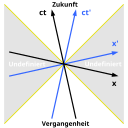present
The present is a term for a not exactly determined time interval between past time ( past ) and coming, future time ( future ). The terms today and now are used as synonyms for this . Sometimes the present is equated with timelessness . The present is the time when all events take place.
Word origin
In the German language, the term present is already used in Middle High German , but at that time only in the meaning of “ presence ”. It was not until the 18th century that the meaning expanded to include a time designation.
grammar
Present in a linguistic context means:
- the linguistic implementation - of the tense - of the present
- the grammatical present tense
The German grammar only knows one tense of the present for a verb :
- Present tense : I love ; I go
physics
An excellent present is not a subject of physics. Only the question of the simultaneity of events can be defined and examined there.
Classical physics
The time arrow determines the direction of time from the past to the future . The past consists of the set of all events that are causally connected to the event called the present, that is, could influence it. This concept of simultaneity is called synchronism .
Quantum mechanics
The Heisenberg uncertainty principle states that time and energy of a quantum leap are not simultaneously arbitrarily determined precisely, so the presence of the exact observation is not accessible: The Now, therefore, is a scale-dependent auxiliary concept.
theory of relativity
With the change in the concept of time since the introduction of Albert Einstein's special theory of relativity , the terms past, present and future have also been reinterpreted. Since two events that take place simultaneously for an observer may no longer take place simultaneously for an observer who is moved relative to them ( relativity of simultaneity ), the term " luminosity " replaces "simultaneity", while past and future represent spaces of events, that are "temporally" removed from an observer; “Spatialness” in turn corresponds to a relationship between two events that cannot be causally related to one another.
The present can thus be defined as the origin of coordinates in a spacetime diagram.
Brain research
The present time : New neurological and psychological studies suggest that the brain processes the present in units of about 2.7 seconds . The everyday term “moment” represents precisely this fact. In addition, studies suggest that 3-second units are also important in poetry (when it comes to recognizing rhyme and rhythm) and music.
sociology
The present contrasts with the ideas that one has of the past (e.g. memory , history , origin , cause) and the future (e.g. hope , fear , vision , development).
psychology
Only in the present is it possible for man to perceive the world and his inner being, the self , and to come into contact with it. In order to describe the present in a more tangible way for patients in the context of psychotherapy and self-awareness , it is called the here-and-now .
Philosophical view
In the context of philosophy , two aspects of the present are important:
On the one hand, it is the contradiction between the consciously perceived now and the impossibility of grasping the now sensually. That is the question of the nature of time itself.
On the other hand, the importance of the here and now in view of human mortality . Two fundamentally contrary world views are possible here:
- To see the moment as the only real thing. The “nothingness of human works” - vanitas - is expressed through sayings such as carpe diem or memento mori .
- Disregarding the moment and subordinating one's own life to a goal in the hope that the person will continue to live in it.
In art theory , this contrast is reflected, for example, in the classic division into - moment-oriented - performing arts and - work-related - visual arts .
religion
In many religions , such as Zen Buddhism, an ideal is to open oneself to the present.
In the Eastern religions such as Buddhism or Hinduism , unlike in the Abrahamic religions , the place of eternal life is not regarded as a heaven following in the future after death , but rather the present moment.
Catholic Cardinal Fulton John Sheen described heaven as "the eternal now".
The Jewish religious philosopher Martin Buber wrote: “But God, the eternal presence, cannot be had. Woe to the possessed who thinks he possesses God! "
literature
- K. Stepath: Contemporary Concepts . A philosophical and literary analysis of temporal concepts , Würzburg 2006.
- Achim Landwehr : Birth of the Present: A History of Time in the 17th Century. S. Fischer, Frankfurt am Main 2014, ISBN 3100448189 .
